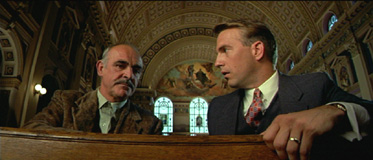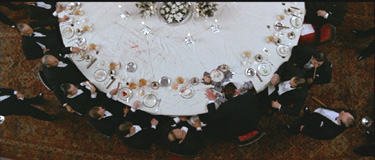|
Newest Reviews:
New Movies -
The Tunnel
V/H/S
The Tall Man
Mama Africa
Detention
Brake
Ted
Tomboy
Brownian Movement
Last Ride
[Rec]≥: Genesis
Hara-Kiri: Death of a Samurai
Indie Game: The Movie
Abraham Lincoln: Vampire Hunter
Old Movies -
Touki Bouki: The Journey of the Hyena
Drums Along the Mohawk
The Chase
The Heiress
Show
People
The Strange Affair of Uncle Harry
Pitfall
Driftwood
Miracle Mile
The Great Flamarion
Dark Habits
Archives -
Recap: 2000,
2001, 2002,
2003, 2004
, 2005, 2006,
2007 , 2008
, 2009 ,
2010 , 2011 ,
2012
All reviews alphabetically
All reviews by star rating
All reviews by release year
Masterpieces
Screening Log
Links
FAQ
E-mail me
HOME
| |
The Untouchables (Brian De Palma, 1987)
 Unquestionably a product of the Regan era, Brian De
Palmaís triumphant pop gangster flick The Untouchables contains within
its slick crime movie exterior a series of probing questions about reactionary
morality. The familiar story of Eliot Nessí (Kevin Costner) band of do-gooder
cops and their fights against Al Caponeís (Robert De Niro) prohibition ring
contains within it a central paradox that screenwriter David Mamet latches onto.
Prohibition wouldnít have risen about if it werenít for a perception that
alcohol causes social problems. Capone would never have risen to power if it
werenít for the conservatism that ushered in the prohibition era. As a
reaction to Capone, the establishment responds with the dispatching of Treasury
agent Ness and his squad of toughs. The film follows the moral trajectory of
Ness, whose idealistic law-abiding good intentions slowly crumble in the face of
reality. Itís easy to see this surprisingly realistic viewpoint as a cynical
one, since itís placed into the context of a film that on many levels operates
on comic book terms, but I think itís instead a circular one. Itís no
mistake that De Palma overloads his compositions with circular imagery, and even
when heís not doing that, his camera begins tracking in advance of the action,
giving the subconscious effect that the camera knows whatís going to happen in
advance, presumably because these events have happened before and will happen
again. The circle of events that gives The Untouchables its moral
quandary is made viscerally thrilling with this form.
Unquestionably a product of the Regan era, Brian De
Palmaís triumphant pop gangster flick The Untouchables contains within
its slick crime movie exterior a series of probing questions about reactionary
morality. The familiar story of Eliot Nessí (Kevin Costner) band of do-gooder
cops and their fights against Al Caponeís (Robert De Niro) prohibition ring
contains within it a central paradox that screenwriter David Mamet latches onto.
Prohibition wouldnít have risen about if it werenít for a perception that
alcohol causes social problems. Capone would never have risen to power if it
werenít for the conservatism that ushered in the prohibition era. As a
reaction to Capone, the establishment responds with the dispatching of Treasury
agent Ness and his squad of toughs. The film follows the moral trajectory of
Ness, whose idealistic law-abiding good intentions slowly crumble in the face of
reality. Itís easy to see this surprisingly realistic viewpoint as a cynical
one, since itís placed into the context of a film that on many levels operates
on comic book terms, but I think itís instead a circular one. Itís no
mistake that De Palma overloads his compositions with circular imagery, and even
when heís not doing that, his camera begins tracking in advance of the action,
giving the subconscious effect that the camera knows whatís going to happen in
advance, presumably because these events have happened before and will happen
again. The circle of events that gives The Untouchables its moral
quandary is made viscerally thrilling with this form.
 Itís this ever-present morality that justifies the
stunningly directed, but vaguely exploitational action set pieces that provide
the most conventionally exciting passages in the film. Each one of them is a
suspenseful doozy, and they all find De Palma working at the height of his
considerable conceptual powers. The most memorable and controversial sequence is
easily the climactic shootout in Chicagoís Union Station, partially because it
features De Palmaís trademark extended slow-motion in an incredibly complex
choreography of gun fighting and nervous tension, but mostly because it has the
audacity to evoke Sergei Eisensteinís classic Odessa Steps sequence from Battleship
Potemkin. I imagine most bristle at this homage because they feel it
fundamentally devalues the originalís serious intent, but with the realization
that The Untouchables is a politically charged film itself, and not just
a mindless parade of violence, those complaints fade away. The sequence brings
with it a distinctly American brand of injustice, perfectly pushing forward the
never-ending cycle of violence and response to that violence that the film
addresses. Kevin Costnerís fair face masks the filmís disturbing message to
such a degree that the end result can easily pass as mindless mainstream
entertainment, but make no mistake: The Untouchables is one of De
Palmaís most trenchant statements about the state of America.
Itís this ever-present morality that justifies the
stunningly directed, but vaguely exploitational action set pieces that provide
the most conventionally exciting passages in the film. Each one of them is a
suspenseful doozy, and they all find De Palma working at the height of his
considerable conceptual powers. The most memorable and controversial sequence is
easily the climactic shootout in Chicagoís Union Station, partially because it
features De Palmaís trademark extended slow-motion in an incredibly complex
choreography of gun fighting and nervous tension, but mostly because it has the
audacity to evoke Sergei Eisensteinís classic Odessa Steps sequence from Battleship
Potemkin. I imagine most bristle at this homage because they feel it
fundamentally devalues the originalís serious intent, but with the realization
that The Untouchables is a politically charged film itself, and not just
a mindless parade of violence, those complaints fade away. The sequence brings
with it a distinctly American brand of injustice, perfectly pushing forward the
never-ending cycle of violence and response to that violence that the film
addresses. Kevin Costnerís fair face masks the filmís disturbing message to
such a degree that the end result can easily pass as mindless mainstream
entertainment, but make no mistake: The Untouchables is one of De
Palmaís most trenchant statements about the state of America.
* * * *
01-24-03
Jeremy Heilman
|